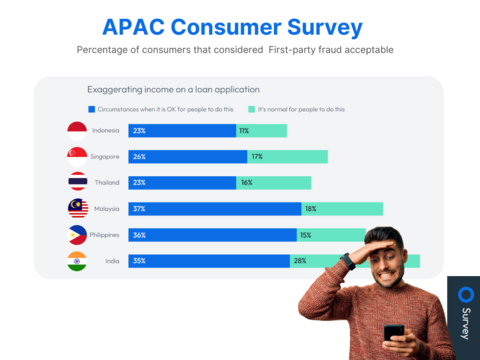FICO Survey: Alarming Acceptance of 'Liar Loans' Among Indonesian Consumers
1 in 4 Indonesians think it’s OK to deliberately mislead on personal loans, mortgages, auto and other applications.
This press release features multimedia. View the full release here: https://www.businesswire.com/news/home/20240923668957/en/

23% of Indonesians say there are circumstances when its ok to exaggerate income on a loan application, while 11% believe it's normal for people to do so. (Graphic: FICO)
Highlights
- A third of Indonesians (34%) think it’s OK or normal for people to exaggerate their income on loan applications
- One in ten Indonesians (10%) believe it’s normal for people to deliberately misrepresent their income on mortgage applications
- Falsifying insurance claims is viewed as the most taboo form of fraud, with more than three in four Indonesians (77%) believing it is not acceptable
Global analytics software leader FICO today shared its latest global consumer fraud research, revealing alarming attitudes toward first-party financial fraud both globally and in the Indonesian market.
The survey finds that while most Indonesian respondents view the misrepresentation of information when applying for financial products and making insurance claims unacceptable, a sizeable portion of the population feels otherwise.
Two in five Indonesians think it is normal or acceptable in some cases to misrepresent their income on an application for a bank account (42%), mortgage (35%) or automotive finance (49%). Additionally, more than a third of Indonesians (34%) believe that exaggerating income on a personal loan application to be normal or acceptable.
These sentiments closely align with global attitudes. The survey reveals that the majority of consumers (56%) firmly reject exaggerating income on loan applications, viewing it as never acceptable. One in four (24%) consider it permissible in certain circumstances, while one in seven (15%) view it as a normal practice.
“Consumers must understand that misrepresentation of information when applying for financial products can lead to serious consequences, even if done unintentionally,” said
More information: https://www.fico.com/en/latest-thinking/ebook/consumer-survey-2023-digital-banking-customer-preferences-and-fraud-controls
Growing Mortgage Sector at Risk of Application Fraud
The Indonesian mortgage market, estimated at
Even when a mortgage application from an existing customer appears legitimate on paper, the established banking relationship can be exploited to commit fraud. By exaggerating income, such as inflating self-employment earnings or overstating bonuses, and omitting debts or misrepresenting personal circumstances, applicants can manipulate the loan process. This makes it difficult for lenders to detect these discrepancies without thorough and proactive verification measures.
“While application fraud presents unique challenges, financial institutions can bolster their fraud defenses through industry-leading data analytic solutions,” said Sharma. “Risk assessments can be enhanced by applying anomaly detection analytics, conducting comprehensive data analysis, and continuously monitoring accounts for signs of sleeper fraud or impending bust-outs.”
Falsifying Insurance Claims Is Most Taboo
According to FICO’s research, falsifying insurance claims is viewed as the most taboo form of fraud, according to FICO’s research, with around two-thirds of consumers globally believing it is never acceptable to exaggerate the value of stolen property or add false items to a claim. This sentiment is echoed by more than three in four Indonesians (77%).
Matching global trends, attitudes shift regarding other financial products. Half of consumers globally, including half of Indonesians, feel it is unacceptable to exaggerate income on a mobile phone contract (51%) or an application for automotive financing (49%).
“The FICO survey reveals concerning public perceptions about application fraud,” noted Sharma. “While many are adopting their views based on circumstances, fraud cannot be justified. Financial institutions that detect fraud before granting credit can protect themselves and prevent customers from inadvertently engaging in questionable or criminal behaviour.”
The survey was conducted in
View source version on businesswire.com: https://www.businesswire.com/news/home/20240923668957/en/
RICE for FICO
+65 9034 7768
lizzy.li@ricecomms.com
FICO
+65 9171 0965
saxonshirley@fico.com
Source: FICO
